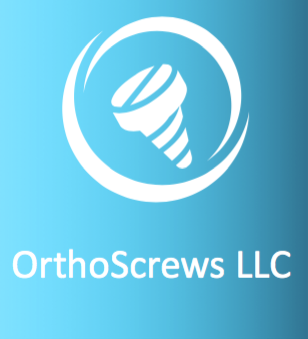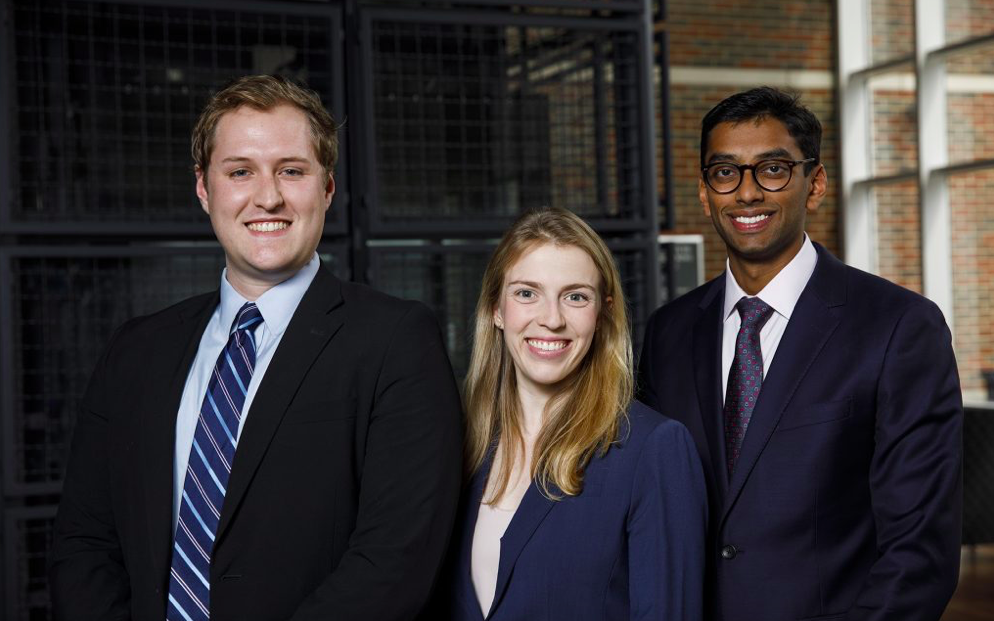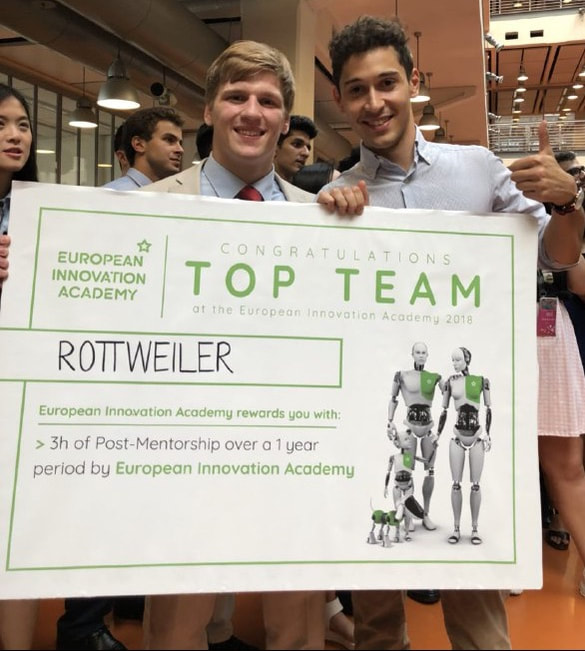Innovation Beyond CampusMany STEM & CREATE students pursue their innovative solutions and products in the world of business. Through the many different opportunities offered to students such as the European Innovation Academy or Startup Weekend, innovation often becomes entrepreneurship.
Below are some currently operating startup business ventures run by STEM & CREATE students. Though their ideas were formulated in an academic setting, these students pushed further in the name of innovation, to bring their solution to market. OrthoScrewsHow It BeganBack in the spring of 2016, Zoe Guckien was a chemistry major from Zionsville, Indiana; Sudarsan Murali was a psychology major from New Albany, Ohio; Alec Hopkirk was a chemical engineering major from Nashville, Tennessee. All three students were also on the STEM Path to the MBA. At the time, they teamed up to tackle the NASA T2U Innovation Project they were assigned that semester in their undergraduate GBA course.
The NASA T2U Innovation Challenge encourages participants to use NASA technology assets within a high-tech patent portfolio for commercial applications. When the team came across a patent for an RFID torque sensing system, they realized the potential the technology had in the medical field. The InnovationGuckien, Murali, and Hopkirk found the patent that led to their innovation on the NASA T2U patent portfolio site where the patented technology is described as a "low cost RFID-based torque and tension sensor for high-performance fasteners, such as bolts." The sensor has the ability to verify a fastener is correctly torqued remotely. Though there was pre-existing technology with this function, this new method is much less expensive, without any detriment to accuracy.
The team realized an extremely unique application for this technology. The medical branch of orthopedics uses screws in order to create the compression necessary in healing bone injuries. While NASA had been using the torque sensor to ensure critical bolts and screws were secure on many different forms of aerospace related machinery, the team recognized how useful the technology would be in orthopedics. Orthopedic screws have a tendency to loosen over time, and this loosening has a plethora of negative side effects such as pain and deceleration of the healing process. Before their innovation, there was no way to monitor orthopedic screws. With their innovation, doctors are actively informed on the status of their patient's screws, allowing them to provide optimal care. Starting UpThis group of STEM Path students created a revolutionary idea, and where this idea could take them is still yet to be entirely determined. Currently, they are developing their business through two platforms established by the National Science Foundation: the Innovation Corps (I-Corps) and the Small Business Innovation Research (SBIR) Program.
Over seven weeks, with the help of a $50,000 grant, I-Corps allows teams to build their business model and develop their customer understanding through over a hundred key interviews. This can lead teams towards additional funding and beneficial partnerships, jump-starting the growth of a small business. OrthoScrews plans on creating a high-level prototype after the conversion of their provisional patent that was filed in January of 2019. Once they have a satisfactory prototype, they will move into Phase I of the SBIR Program. Current Investor Pitch
Your browser does not support viewing this document. Click here to download the document.
Rottweiler SecurityHow It BeganIn the summer of 2018, STEM Path student Jack Zimmerman traveled to Turin, Italy to participate in the European Innovation Academy (EIA). EIA is a three week long global innovation opportunity where students work with other students from all over the world to create and pitch ideas with the help of experienced mentors and business people. (For more information on EIA, visit our innovation abroad website).
During EIA, Jack and his team designed their idea. They received the award of Top Team for the final business presentation on their innovation: Rottweiler Security. The InnovationRottweiler Security aims to provide protection for your personal belongings. Simply connect your phone to the small, portable security device. After placing the device in your bag with your essentials, Rottweiler Security creates a green zone and a red zone, two different perimeters around the device that encompasses nearby items. The device can move freely within the green zone, however, in the red zone an alarm will sound, alerting the user.
Rottweiler Security offers "in the moment protection" while also preserving your privacy, since the device uses GPS triangulation as opposed to GPS tracking. Whether an item is forgotten and left behind, or stolen, Rottweiler Security protects its user. Starting UpAfter their success at the European Innovation Academy, Jack said he and one other team member, Andrea Gilbert, decided to take their idea to the next level and create a prototype,
"We're currently deep in the technological development phase trying to get our technology to a go-to market and testing status. In the meantime, we've been working to become patent pending and going to business competitions to try to get whatever funding we can." And they have found success at business competitions. On March 26, 2019, as a co-founder of Rottweiler Security, Jack participated in the Edgar K. Aldag Jr. Business Plan Competition. He placed 3rd, and received a $2,000 award to contribute to funding his business. |
Aldag Competition Presentation
Your browser does not support viewing this document. Click here to download the document.
|
Jack and Andrea |
ME-CommerceHow It BeganSTEM Path student Sani Ghulamani participated in the 2019 Startup Weekend hosted on The University of Alabama's campus. Startup Weekend is a condensed innovation challenge, during which participants form groups and create a business platform for an innovative product idea over the course of three days.
At the 2019 Startup Weekend, Sani and his group members, Alan MacGavin, Jake Sacco, Louis Shulman, and Kyle Bishop, pitched their initial product, FatTails. FatTails was to be a website that used long tail keyword searches to quickly find niche gifts for professionals. The InnovationPost-Startup Weekend, Sani and his group decided to pivot their idea toward an e-commerce agency that offers what they call "e-commerce by example". Through this shift, ME-Commerce was born. ME-Commerce looks to provide small businesses with assistance in terms of their online presence. They plan on focusing their company into three areas: social media marketing consulting, contracted website development, and e-commerce for businesses.
Starting Up
In order to gain recognition and potential funding, ME-Commerce participated in the Edward K. Aldag Jr. Business Plan Competition. For the purposes of the Aldag Competition, ME-Commerce organized itself under the existing business MacGavin E-commerce, owned by group member Alan MacGavin. ME-Commerce won an award of $500 for placing Room Runner Up. Sani says he sees more success to come in the future,
"Right now, we view ourselves as a network of entrepreneurs, collectively creating e-commerce stores, and after those gain traction, we hope to help smaller businesses grow by building them an e-commerce presence." Aldag Competition Presentation
Your browser does not support viewing this document. Click here to download the document.
|





